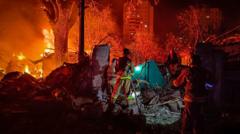In a significant diplomatic gesture, Italy's Prime Minister Giorgia Meloni has expressed the nation's willingness to support the Vatican in hosting potential peace talks to address the ongoing conflict in Ukraine. This comes in the backdrop of former U.S. President Donald Trump's suggestion to consider the Vatican as a mediator, a proposal that has yet to be solidified into a concrete plan.
Italy Backs Vatican Mediation in Ukraine as Trump Steps Back

Italy Backs Vatican Mediation in Ukraine as Trump Steps Back
Italy expresses readiness to support the Vatican's mediation efforts in Ukraine conflict, as discussions remain tentative.
The Pope has reiterated the Vatican's readiness to facilitate dialogue between the warring parties, but recent meetings in Istanbul have yielded additional Russian demands, complicating the prospect of negotiations. Ukrainian President Volodymyr Zelensky remains open to the Vatican's involvement, having engaged with Meloni about various potential platforms for talks, including alternative venues like Turkey and Switzerland.
While the hope of progress remains alive, the Kremlin appears intent on negotiating under its own terms, including the contentious issue of recognizing annexed territories in Ukraine. The outcome of these proposed discussions remains uncertain, but the Vatican's historical role in mediating conflicts suggests it could lend moral authority to usher in a compromise. However, it is yet unclear how significant a role the Holy See could truly play amidst the complex geopolitical realities at hand.
Despite a diplomatic history of fostering dialogues, opinions vary on the Vatican's influence over Russia’s recruitment for talks. Critics argue that the Kremlin shows little inclination to concede any ground, especially given the current international stance that supports Ukraine's sovereignty. As the diplomatic chess game unfolds, the likelihood of achieving lasting peace appears as challenging as ever, with deeper issues lingering beneath the surface.
While the hope of progress remains alive, the Kremlin appears intent on negotiating under its own terms, including the contentious issue of recognizing annexed territories in Ukraine. The outcome of these proposed discussions remains uncertain, but the Vatican's historical role in mediating conflicts suggests it could lend moral authority to usher in a compromise. However, it is yet unclear how significant a role the Holy See could truly play amidst the complex geopolitical realities at hand.
Despite a diplomatic history of fostering dialogues, opinions vary on the Vatican's influence over Russia’s recruitment for talks. Critics argue that the Kremlin shows little inclination to concede any ground, especially given the current international stance that supports Ukraine's sovereignty. As the diplomatic chess game unfolds, the likelihood of achieving lasting peace appears as challenging as ever, with deeper issues lingering beneath the surface.


















